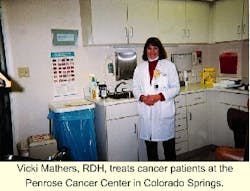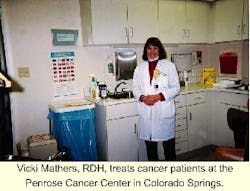Dental Oncology
We often hear about a patient who has breast cancer and will be undergoing radiation and chemotherapy. In addition, about 100,000 people will be diagnosed every year with cancer to the head and/or neck, including thyroid and mouth cancers. Treating patients who are receiving chemotherapy-radiation therapy requires special attention. At least 40 percent of all patients on a "chemo" protocol will have oral complications. The majority of patients with leukemia or bone marrow transplants also will develop problems.
Management of the cancer patient in private practice begins with a prophylaxis prior to chemotherapy treatment. This is done to eliminate oral infection and complications. If the patient has already had an in-dwelling venous catheter (Groshong or Port) placed for future chemotherapy, then they need to be premedicated with an antibiotic before dental treatment. Many hygienists answer questions from our friends or patients about mouth sores, dryness, or what brush to use.
Penrose Cancer Center in Colorado Springs, Colo., has had a dental hygienist on staff since the early 1980s. Since 1993, Vickie Mathers, RDH, has been treating patients undergoing pre-, concurrent, and post-cancer treatment.
Mathers, along with the other oncology team members, helps assess all patients being treated in the head and neck area before they begin therapy. Recommendations may range from having teeth extracted to making dental trays for home fluoride treatments. Due to side effects of chemotherapy and radiation on oral soft tissues, pretreatment strategies are an important step in decreasing any oral complications.
Xerostomia is probably the most common side effect of cancer treatment. As the volume of saliva decreases, the pH becomes lower, resulting in more acidity and a decrease in beneficial bacteria. In turn, an increase in dental caries, oral infections, and even sores and pain can occur. To state that saliva is essential to maintaining overall good oral health is an understatement.
Other oral problems arising from the lack of saliva may result in bleeding gums or a loss of taste. More severe complications - such as soft tissue necrosis, the ability of the mouth to heal, trismus, which is spasms in the jaw (TMJ) - are not uncommon.
Of course, the best defense against oral complications during cancer treatment is good home care. However, sometimes even that is not enough. If the blood counts are too low, it is recommended that flossing be suspended.
All patients undergoing chemotherapy - not just head and neck cancer patients - are instructed to visit Mathers. It is recommended that they begin rinsing with an eighth of a teaspoon of baking soda to one-half cup of water on the first day of chemotherapy and continue until treatment ends. This procedure helps neutralize the acidic flora created in the mouth. If mouth sores appear, patients are instructed to increase the frequency of baking soda rinses to every two hours.
Mathers makes special mouthguards for patients to wear during treatments. The mouthguards serve as added protection from radiation. She monitors these patients weekly during the course of treatment, and then follows their progress for two to three years afterwards. Often, it is recommended that patients continue home fluoride for life!
A regimen for home fluoride is detailed for all oncology patients. A fluoride tray, much like a bleaching tray, is made at the dental oncology clinic. Mathers uses a neutral 1.1 percent fluoride, such as Prevident or GelKam.
Over-the-counter rinses, such as Listerine, Scope, and Cepacol contain alcohol, which would further dry out the tissue, and are not recommended. Due to xerostomia, a daily home fluoride may be necessary. Also, a variety of saliva substitutes can be recommended. Laclede makes a dry mouth toothpaste, mouthwash, and gum. Also, there are a variety of saliva substitutes, including a prescription tablet called Salagen.
Mathers' colleagues recognize her contributions to the Cancer Center. She is a member of the International Society of Oral Oncology. She encourages any hygienist who is interested to pursue this line of work. Duties include patient education, making fluoride trays, prophylaxis, and consulting.
The University of Missouri-Kansas City, School of Dentistry has put together a guide titled, "Oral Management of the Cancer Patient." These guidelines provide the basis of Mathers' treatment philosophy. Anyone wishing to pursue this line of work should contact their local cancer care center or oncology/hematology group and discuss the possibilities. There is a definite and increasing need for a dental oncologist as part of the treatment team.
Connie L. Sidder, RDH, is based in Fort Collins, Colorado. She can be reached at [email protected].
Vickie Mathers, RDH, treats cancer patients at the Penrose Cancer Center in Colorado Springs.

